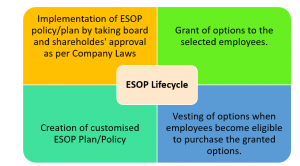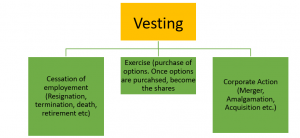In India, Employee Stock Options Plans (“ESOPs“) are among the most trending compensation methods. Earlier, ESOPs were used as a tool to hitch the senior management to make their pay competitive. But in the past few years, the trend is changed. Now the ESOPs are not only to retain the senior management but also extended to the employees, especially by the startups.
Many startups, including ShareChat, PhonePe, Wakefit, Licious, have recently awarded ESOPs to their employees, including administration, production, back-office etc. Infosys, one of the earliest Indian IT firms to offer ESOPs, also planning to expand its employee stock options to include a larger base of employees to retain the talent. “We already have ESOP (employee stock option) programmes today, which go to a lower level within the company, not at the entry-level, but a couple of levels above that. And that’s something which is a huge success for the company,” Salil Parekh, chief executive officer, Infosys, told ET in an interview last month.
ESOP is a non-cash equity-based compensation. When the company share price rises, plan participants share in the financial gains. When the share price falls, plan participants share in the loss. For this reason, employees at ESOPs are known as employee-owners because they share in the risks and rewards of ownership.
ESOPs certainly help structure a balanced compensation plan for the employees, including fixed and variable pay linked to the tenure in the company and performance or achievement of the pre-defined goals.
Before deep-diving into this concept, let’s understand few crucial terminologies:
- ESOP– ESOP is an abbreviation of Employee Stock Option Plan, which describe the employee benefit plan under which the company offer ownership interest to the employees in the company.
- Grant of options– Grant refers to the grant of employee stock options by entering into an agreement between company and employee. The date of signing the agreement or a specific date mentioned, as the case may be, is the grant date.
- Vesting of options– Vesting means the entitlement or right, not the obligation to buy options, after fulfilling the conditions set out in the agreement or grant letter. The date on which an employee is entitled to purchase the options is the vesting date.
- Vesting period- means the time gap between the grant date and vesting date.
- Exercise of option- Exercise of option means the purchase of vested options by the employees.
ESOP Lifecycle-


Example-
- Preeti has been granted 400 ESOPs under the Company ESOP Plan via a grant letter dated May 20, 2021. The exercise price is the face value, i.e., Rs.10/-
- After one year from the date of grant, the options will vest uniformly over four years. So below is the vesting table along with the exercise price:

- Tax to be paid by Preeti- Let’s assume the fair market value (“FMV”) of the shares is Rs. 100 while Preeti has exercised the options at face value, i.e., Rs. 10/-. So Preeti will have to pay tax on the notional value of her income, i.e., the difference between the FMV and exercise price. Below is the mathematical description:
Total number of options- 400
Exercise Price per option– Rs.10/-
The total price paid by Preeti- 400*10=Rs. 4000/-
Fair Market value per share – Rs. 100/-
Fair market value of purchased shares- 400*100= 40,000/-
Now taxable amount- 40,000-4000= 36000
So now, Rs.36000 will be added to Preeti’s income, and Preeti shall be liable to pay tax as per her tax slab.
Preeti shall be liable to pay tax only on the exercise of options.
- Suppose in the future Preeti’s company provide liquidity by any means. In that case, the shares held by Preeti shall be transferred to the investor/promoters, and Preeti will receive the sale amount.
So, the profit or loss to Preeti will depend upon the company’s growth, FMV, and deal price.
Many companies are nowadays adopting a cash settlement of vested options for providing liquidity to their employees.
In the recent past, especially during pandemic, buyback has also been trending among the companies.
Conclusion-
So, ESOP is a win-win situation for both the company and the employee. At one part, it is the most trending method to retain employees and balance employee compensation plans; on the other side, it boosts personal wealth and improves job security.
If you are struggling with ESOP related issues, please feel free to reach out to us.
Happy Reading!





Pingback: fildena online buy
Pingback: order amoxil 250mg generic
Pingback: levitra vs viagra
Pingback: buy cheap online dapoxetine
Pingback: sildigra 120
Pingback: vidalista dose
Pingback: can women take vidalista
Pingback: vidalista 100mg
Pingback: malegra fxt 140mg
Pingback: fildena super active 200 mg
Pingback: cenforce 200
Pingback: fildena professional
Pingback: fildena Ч—Ч•Ч•ЧЄ Ч“ЧўЧЄ
Pingback: kamagra® gold
Pingback: is tadalafil good for women
Pingback: Sildenafil Prices in us
Pingback: vermact12
Pingback: amoxil antibiotics
Pingback: super kamagra jelly
Pingback: fildena super active
Pingback: stromectol without prescription
Pingback: lipitor generic
Pingback: cenforce 100 india
Pingback: extra super tadarise 40 mg
Pingback: spedra avanafil
Pingback: Cenforce online order
Pingback: benemid cost
Pingback: side effects of isotroin 10 mg
Pingback: priligy 60 mg buy
Pingback: cialis orange juice
Pingback: hydroxychloroquine sulfate 200mg
Pingback: sildamax 200mg